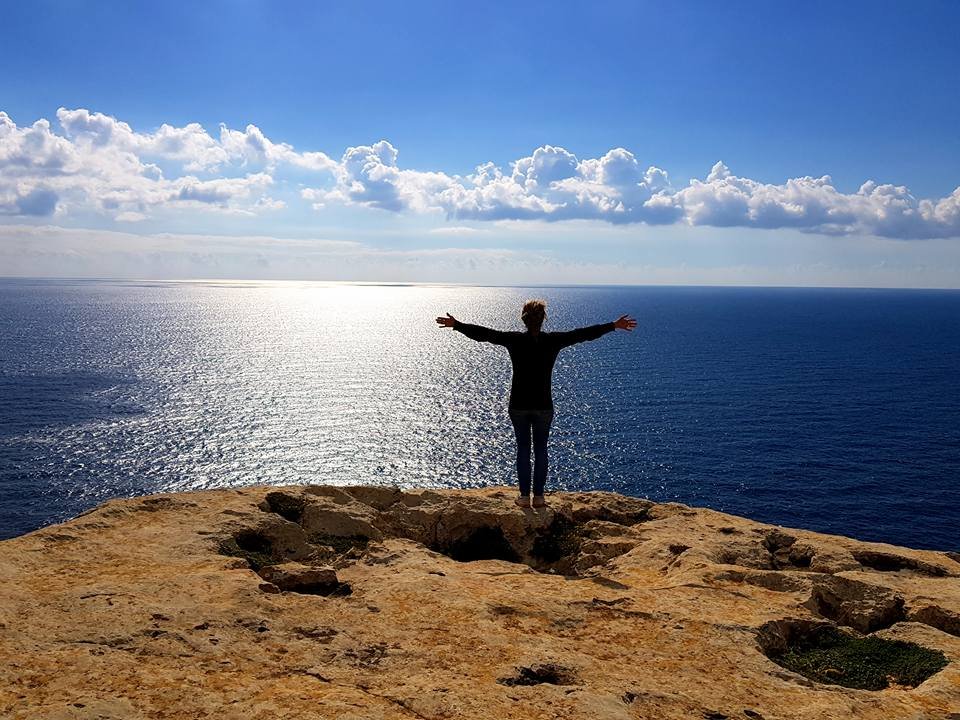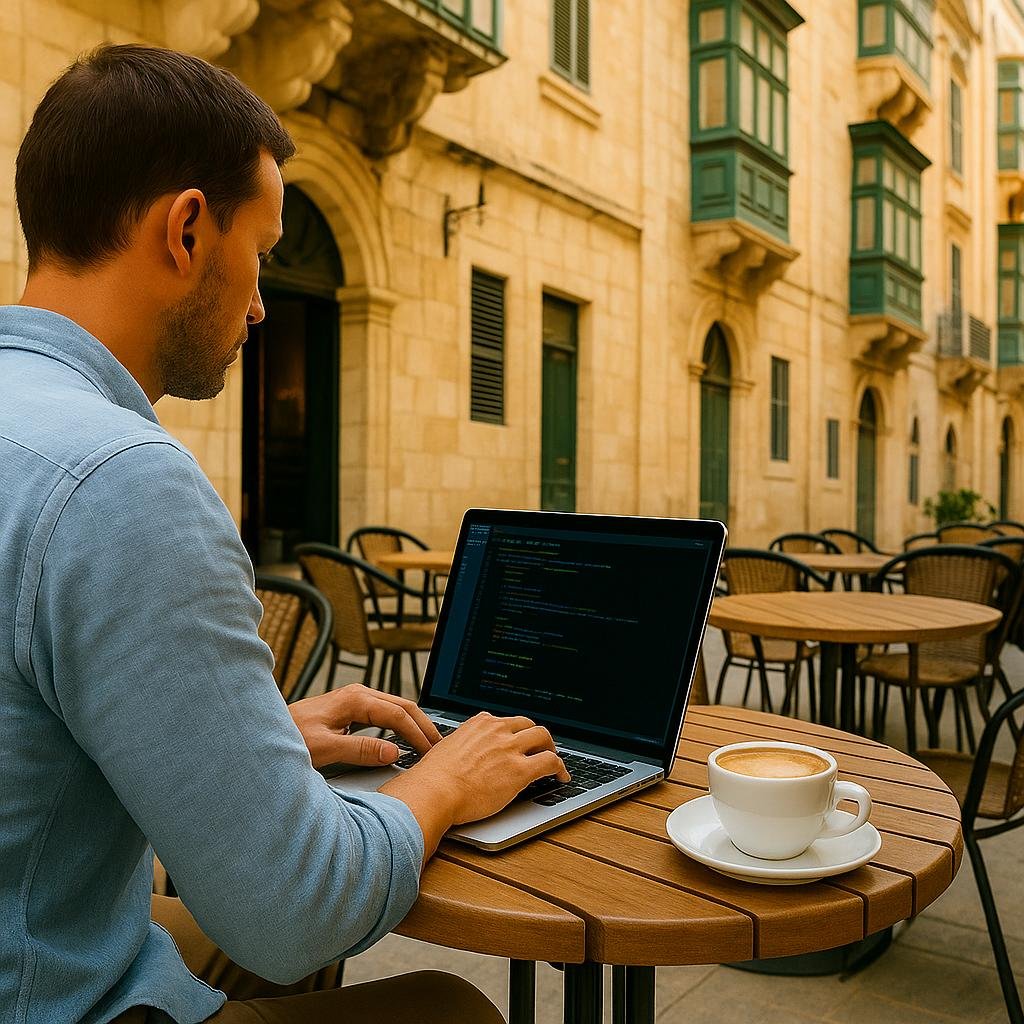Over the past decade, digital nomadism has gone from quirky fringe lifestyle to full-blown global movement. In 2019, just before the world turned upside down, the United States had around 7.3 million digital nomads. By 2024, that number had ballooned to 18.1 million, a staggering 148% increase in just five years. Globally, estimates suggest over 40 million people are now living and working remotely, armed with laptops, noise-cancelling headphones, and an ever-changing backdrop of cafés, co-working hubs, and questionable Airbnbs.
If this pace keeps up (and who’s to say it won’t?), we could be looking at well over 100 million nomads worldwide by 2035. That’s not just a trend – that’s a major shift in how people work and live.
And somewhere in the middle of this Wi-Fi-powered revolution stands Malta: sun-drenched, English-speaking, strategically located, and quietly becoming a magnet for this new borderless worker.
Why Malta Appeals to Digital Nomads?
While many countries rushed to launch remote work visas after the pandemic, Malta was ahead of the curve. It introduced its Nomad Residence Permit (NRP) back in 2021, giving non-EU remote workers a clear legal route to live in Malta while working for foreign employers.
And the offer isn’t just bureaucratic, it’s appealing. Malta ticks many of the right boxes:
- 🗣️ English is not only widely spoken – it’s an official language
- ⚡ High-speed fibre and full 5G coverage across most of the islands
- 💰 0% income tax in the first year, rising to just 10% in later years for qualifying nomads
- ☀️ Mediterranean lifestyle with over 300 days of sunshine a year
- ✈️ Easy access to mainland Europe, North Africa, and the Middle East
Malta doesn’t just market itself well it performs well too. In the 2025 Global Remote Work Index by Global Citizen Solutions, Malta ranked:
- 🏅 6th overall (Score: 84.48)
- 🧳 3rd for visa benefits
- 💻 16th for tech and innovation
- 🌍 25th for quality of life
Forbes, Rated Malta 3rd place in 2024 for Digital Nomads
En 2024, Forbes ranked Malta 3rd globally as a destination for digital nomads, scoring 7.29 out of 10. Over the past year alone, there were more than 18,600 Google searches for “Malta digital nomad visa”—a clear sign of rising interest. The country appeals to both freelancers and remote employees, particularly those in gaming, finance, and tech, thanks to its thriving ecosystem, tax incentives, and Mediterranean lifestyle.
But while structured indices like Forbes or the Global Citizen Solutions Remote Work Index consistently place Malta near the top, the view from the ground is more nuanced.
Sur Nomad List, a real-time platform built on user reviews from digital nomads themselves, Malta scores noticeably lower. Complaints often cite:
- High cost of living, especially rent and groceries
- A limited sense of community, especially outside Valletta and Sliema
- Mixed reviews on nightlife, walkability, and the “fun” factor
- Seasonal overcrowding and housing shortages during peak months
Unlike glossy rankings, Nomad List surfaces the lived experience, and here Malta tends to trail more established hubs like Lisbon, Chiang Mai, or Mexico City. The message is clear: Malta’s policies are strong, but the on-the-ground reality still has room to grow.

The Three Areas Malta Need to Improve to Stay Competitive
With the nomad economy expected to grow further in the coming years, Malta is in a prime spot to benefit, if it continues investing in the right areas: Namely
- Expand coworking hubs and community events to help newcomers integrate
- Ensure housing availability to avoid price distortions (a rising concern globally)
- Promote lesser-known areas beyond Valletta and Sliema to spread the benefits
If it gets this right, Malta could become Europe’s leading micro-hub for digital nomads – a sort of Mediterranean Singapore for the remote work age.

Malta’s NRP received 1,031 applications in 2024.
Malta’s nomad residency permit is open to non-EU/EEA/Swiss nationals who:
- Work remotely for a company registered abroad
- Own or partner in a foreign business
- Work freelance with clients outside Malta
Applicants must:
- Show a minimum monthly income of €3,500 (roughly €42,000 per year)
- Hold valid travel documents et health insurance
- Pass a background check
- Provide a valid rental contract as proof of accommodation
Le visa is valid for 1 year and can be renewed for a maximum stay of 4 years. A minimum of 5 months per year must be spent in Malta to qualify for renewal.
- The application fee is €300 per person, with an additional €27.50 card fee and the application can be made online
- Family members (spouse and dependents) can be included, but they are not allowed to work locally
- The scheme prohibits work with Maltese clients or companies
According to the Residency Malta Agency, 1,031 digital nomad permits were applied for in 2024, with a 78% acceptance rate. Of those, 49% were remote employees, 42% self-employedet 9% freelancers, with an average income of €60,000/year.
Year 1, 0% Tax on Foreign Sourced Income with DNP
The tax law governing digital nomads in Malta follows the country’s general tax framework. It focuses on income tax and tax residency rules. If you’ve obtained the DNP, you benefit from a clear structure and are not automatically considered a tax resident.
Malta uses a progressive income tax system ranging from 15% to 35%, depending on income and residency status. However, nomads on the permit are only taxed on income generated within Malta, not on their global earnings.
How to Maintain Non-Tax Residency Status in Malta?
- Your income must come from foreign sources, not Maltese clients
- You must not exceed 183 days in Malta per year unless covered by the permit
Malta’s rules are clear: as a digital nomad, you’re permitted to provide services or run a business only for clients or companies based outside Malta. Local work or income from Maltese sources such as renting out property doesn’t qualify and is subject to Malta’s standard income tax, which can reach up to 35%. If you earn such income, you must register for tax purposes and file an annual return.
What about double taxation?
Malta has double taxation agreements (DTAs) with around 80 countries, y compris les US, Canada, India, and Australia. These treaties help ensure you don’t get taxed twice on the same income — once at home and again in Malta.
If your home country has a DTA with Malta, any taxes you’ve already paid abroad can be credited or offset against what you’d otherwise owe in Malta. In some cases, you may owe nothing at all, depending on the difference between the two tax rates.
However, if your country doesn’t have a DTA with Malta, and you spend more than 12 mois in Malta, you may face taxation both at source and locally, even if your income is earned abroad.
Réflexions finales
The way we work is changing — and so is the way we holiday. Malta’s digital nomad visa sits at the crossroads of these two shifts, offering more than just a sunny backdrop for Zoom calls. It’s a chance to live with intention, explore new cultures, and stay connected without compromise. Whether you’re chasing productivity or perspective, Malta proves that work and lifestyle no longer need to be at odds, they can be part of the same journey.
Sources d'information
Global Citizen Solutions – Malta Digital Nomad Report 2025
Lovin Malta – Malta ranks third best country for digital nomads
Forbes – Countries with a digital nomad visa for Americans
Business Insider – 29 countries that offer digital nomad visas
Cable.co.uk / M-Lab – Worldwide Broadband Speed League 2021 (PDF)
Numbeo – Cost of Living Comparison: Valletta vs Frankfurt
Residency Malta Agency (Official Government Site) – Permis de séjour pour nomades








